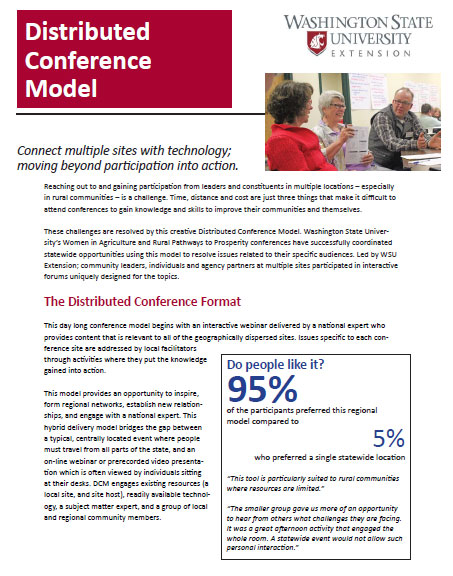Connect multiple sites with technology; moving beyond participation into action.
Do you want access to national experts, regional leader participation and resources to help take local actions without traveling to an expensive statewide event? WSU Extension has developed a new Distributed Conference Model (DCM) that can make that happen.
Reaching out to; and gaining participation from community leaders and constituents is a challenge for many reasons – time, distance and cost are just three things that make it difficult to attend conferences to gain knowledge and skills to improve their communities and themselves. These challenges are resolved by this creative Distributed Conference Model (DCM.) WSU’s Women in Agriculture and WSU’s Rural Pathways to Prosperity conferences are two examples of successfully coordinated statewide efforts highlighting the use of the model. These programs were organized at the state level by extension, and facilitated at the site level by community leaders and agency partners.
The Distributed Conference Model using technology, followed by facilitated, small group exercises can be modified and used in other venues. This model provides Extension or other event organizers with a conference method that can be replicated without everyone needing to become an expert in the topic area.
The Format
This daylong conference model begins with a webinar delivered by a national expert who provides content that applies to all of the geographically dispersed sites. As part of the webinar, participants at each site have the opportunity to ask questions on the webinar. Issues specific to each conference site are presented by a local presenters through a moderated panel discussion. Following these presentations the knowledge gained is put into action through facilitated activities.
In Washington State, two successful extension programs based on the Distributed Conference Model are: the Women in Ag Conference which has tackled the issues of financial health, how to manage change, and farm planning for the past three years; and the Pathways to Prosperity Conference that provided an overview of successful communities’ work to enhance the entrepreneurial ecosystem and a framework to use existing resources for economic growth.
The Engagement
Local engagement will be different based upon your topic area, audience and content. Below are two different ways WSU Extension engaged participants in their own learning and desired outcomes.
Empowering Individuals with Women in AgParticipants learn a specific skill that is tied to the national webinar speaker and given an experiential exercise to build their knowledge and skills. They complete a 2-part Action Planning form; giving one to the planning committee for collecting data about important issues. They in turn develop a statewide plan to deliver additional, relevant classes. |
Engaging Communities with Pathways to ProsperityParticipants brainstormed assets, barriers and project ideas to improve their community’s entrepreneurial ecosystem and economic vitality. Local facilitators followed a detailed agenda with guidance from the Program Committee. Action Planning forms were collected to help find relevant resources and options for continuing on with the work. |
Importance of Site Selection and Facilitators
This model works best when you have a competent, engaging site facilitator that takes the “conference out of the box” and takes it on as their own – reaching out to their stakeholders and media outlets to find the right panelists and participants and keeping them all engaged throughout the day. There is value in having some regionalism for interesting conversations and sharing of resources and ideas.
Interested?
Here is a Executive Summary of DCM; a manual is currently under development. If you have questions or would like more information about DCM, please contact, Debra Hansen at debra.hansen@wsu.edu [509-684-2588] or Monica Babine at babinem@wsu.edu [425-827-8015].
For the Lincoln county EDC it was an awesome opportunity for us hear a national speaker AND then pull people back to the existing strategy; reminding them that we do have a plan and just about everything they just voted for is in it.”
Lincoln County EDC Director, Margie Hall
Successful Programs
Visit the following websites to see the Distributed Conference Model in action:


